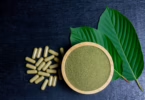For a few days, Jennifer Brandt’s petition drew very little attention.
In April, Brandt requested that the Virginia Board of Pharmacy make big changes to how it regulates kratom, a widely available medicinal plant. Kratom is marketed as a natural pain reliever, mood booster and at-home solution for addiction cravings.
The petition has since received more than 2,900 comments — primarily from addicts describing how kratom has repaired their lives. Despite that, pharmacists say there need to be guardrails around kratom for community safety.
Brandt’s petition proposes guardrails of the highest order: a Schedule I classification for the chemicals in kratom.
Such a classification would put the chemicals in kratom — which are derived from the leaves of a tree native to Southeast Asia — on par with heroin, LSD and opiates. The chemicals targeted to be scheduled are called mitragynine and 7-hydroxymitragynine.
The classification would make kratom more inaccessible than opioids — most of which are Schedule II because they are still seen as having a medical use for pain relief.
It would be a marked shift for a product that is now currently sold in gas stations, smoke shops and convenience stores. Purchasers need only be 21 to legally buy kratom, which comes in mixed drinks, capsules and flavored powder packets.
Brandt’s petition will be heard by Virginia pharmaceutical regulators on June 25. At that point, the Virginia Board of Pharmacy will either deny Brandt’s request or vote to support the request.
Brandt, who works as a pharmacist in Hampton, could not be reached for comment.
A vote to support the petition would kickstart a formal rulemaking process to make the Schedule I status Virginia law. Gov. Glenn Youngkin, Attorney General Jason Miyares and other executive branch agencies would each weigh in on the decision.
Kratom has grown more popular in the past decade, gaining a fan base among alcoholics, opioid users and other groups of addicts in recovery who say that kratom has given them a lifeline.
Those communities say kratom takes the bite out of withdrawal, which can cause shakes, nausea and severe anxiety. For alcoholics, withdrawal can be lethal.
Jeremy Tillem used kratom to detox from heroin in 2018. He has been sober since 2019 and vigorously opposes the petition to schedule the drug.
“Kratom basically saved my life,” said Tillem, 39, who runs two recovery houses in Richmond and works as a painter by trade.
Tillem still takes kratom twice a day. In the morning, he swallows a packet of kratom powder with his morning coffee. He repeats that process at night.
The result is an overall sense of well-being that has enabled the longest stretch of sobriety in his life, Tillem said.
“If they outlaw kratom people are going to turn back to addiction,” Tillem said. “They are going to create more addicts that way if they criminalize it.”
The majority of public comments submitted to the Board of Pharmacy echo Tillem’s claim: that kratom is a product with life-saving potential for struggling addicts.
On the other hand are pharmacists who fear that the kratom “cure” is worse than the disease.
Joshua Crawford, director of clinical pharmacy services for Bon Secours Mercy Health System, wrote that kratom’s potential for abuse is “well-documented.”
“Our communities are besieged by an ongoing opioid epidemic and a lot of resources and effort are being utilized to help combat this plague. The ease of kratom’s availability in our communities help fuel the opioid-epidemic,” Crawford said.
Writing on behalf of the Virginia Society of Health System Pharmacists, Crawford said the group “support(s) the petition to make mitragynine and 7-hydroxymitragynine Schedule I substances.”
Another pharmacist, Shane Knisely, said that pharmacists “stand with the decision to regulate substances that pose significant health risks.”
The Virginia Society of Health System Pharmacists did not return email and calls seeking comment on Tuesday.
The existing research on kratom has proven controversial. Scientists have studied the plant for more than a decade. According to a fact sheet produced by the Drug Enforcement Administration, kratom was once used as a stimulant by Southeast Asian farmers.
In some cases, it was used as a substitute for opium, which grows in the region. Kratom comes from the same family as the coffee tree, the fact sheet reads.
Several federal agencies, including the FDA, have taken a vocal position against it, but have not been able to enact a federal ban on the substance. It is not FDA-approved as a medicine.
Meanwhile, other reputable scientific groups support research into kratom as a way to manage the disease of addiction. Among those is the National Institute for Drug Abuse, which says that fatal overdoses from the plant are “extremely rare” and has funneled grant research into the plant’s medicinal uses.
Mac Haddow, a lobbyist for the American Kratom Association, believes that the difference is illustrative of the FDA’s “blind hatred for kratom.”
“The FDA has had a longstanding bias towards natural supplements,” Haddow said. “What that means is these products that could be potentially beneficial all go into the garbage heap.”
Haddow acknowledges that kratom is likely addictive, but likens kratom-tolerance to a caffeine or soda habit. “It’s like you were addicted to a Diet Coke,” Haddow said.
And Haddow is skeptical of the integrity of findings from medical examiners who say kratom is causing overdose deaths.
In February, a Washington Post investigation used those nationwide medical examiner statistics to report that kratom contributed to or caused 4,100 deaths in the U.S. between 2020 and 2022.
Haddow thinks those reports are often filed by medical examiners who don’t understand that kratom is being used to wean a person away from a more harmful addictive substance, like heroin. Haddow thinks in those cases death was more likely caused by the heroin as part of a relapse.
He points to a CDC study that took a granular look at deaths between 2016 and 2017. Of 91 deaths, only 7 were identified where kratom was the only active substance.
“If in the course of trying to wean off of heroin, they die, then kratom is not the cause of those deaths,” Haddow said.
If the Virginia Board of Pharmacy approves the petition, the rulemaking process would take at least four additional months. Regulators would host a public comment forum and two more public comment periods.
Kratom is easily found at local Richmond smoke shops. At Capital Smoke Shop on Broad Street, assistant manager Trevis Spease said the store has a regular clientele that stops in to buy kratom.
Spease feels the product is helping them. He recalls how the same clientele used to come in shopping for drug paraphernalia, a sign that they were still using hard drugs like methamphetamines.
Spease, 22, called kratom a medicine and a “road to recovery” for addicts.
“It’s an option, honestly. I don’t think they should take it away,” Spease said. “I think they would be criminalizing addicts overnight.”







